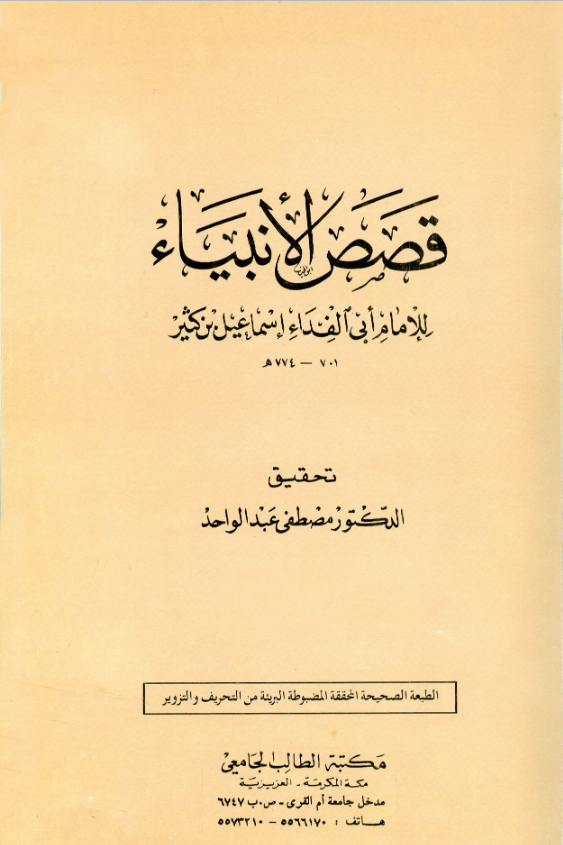The source of the book
This book is published for the public benefit under a Creative Commons license, or with the permission of the author or publisher. If you have any objections to its publication, please contact us.

قصص الأنبياء
(0)
Author:
Ibn Kathir al-DimashqiNumber Of Downloads:
74
Number Of Reads:
154
Language:
Arabic
File Size:
12.31 MB
Category:
ReligionsSection:
Pages:
748
Quality:
excellent
Views:
1463
Quate
Review
Save
Share
Book Description
يُعد كتاب قصص الأنبياء للإمام ابن كثير الدمشقي (701 – 774هـ) من أهم الكتب التي جمعت أخبار أنبياء الله ورسله كما وردت في القرآن الكريم والسنة النبوية، مع الاستفادة من ما صح من الروايات الإسرائيلية لتوضيح بعض التفاصيل. الكتاب يُعتبر مرجعًا أصيلًا في السيرة والتاريخ، ويُظهر بأسلوبه المميز كيف ارتبطت قصص الأنبياء بالعقيدة والتربية والوعظ.
يبدأ ابن كثير كتابه بقصة خلق آدم عليه السلام، ثم يتتبع قصص الأنبياء بترتيب زمني، مثل نوح وإبراهيم وموسى وعيسى عليهم السلام، وصولًا إلى خاتم الأنبياء محمد ﷺ. ولا يكتفي بسرد القصة سردًا تاريخيًا، بل يعلّق على الآيات والأحاديث، ويُبيّن الحكم والدروس المستفادة، مما يجعل الكتاب يجمع بين الجانب الروحي والتربوي والتاريخي.
أحد أبرز ما يميز الكتاب هو الاعتماد الكبير على القرآن الكريم كأساس في العرض، حيث يفسر الآيات المتعلقة بكل نبي ويورد ما ورد في الأحاديث الصحيحة. كما يتعامل بحذر مع الإسرائيليات، فيذكر ما لا يخالف العقيدة ويرفض ما فيه باطل أو إساءة للأنبياء.
الكتاب ليس مجرد تجميع للأحداث، بل هو دروس وعبر يستلهم منها القارئ الثبات على الحق، الصبر في مواجهة الابتلاءات، والتوكل على الله كما فعل الأنبياء في دعوتهم. ولهذا ظل الكتاب حاضرًا بقوة في المكتبة الإسلامية، وتناقلته الأجيال كمرجع للتعلم والتربية.
إن قصص الأنبياء لابن كثير ليس كتابًا تاريخيًا فحسب، بل هو منهج إيماني يربط القارئ بسيرة الرسل الذين اصطفاهم الله، ويغرس في النفس قيم الإيمان واليقين والصبر والثبات. لذلك اعتُبر واحدًا من أروع ما كُتب في بابه وأكثره فائدة للمسلمين والباحثين في السيرة والتاريخ.
Ibn Kathir al-Dimashqi
Imad Al-Din Abu Al-Fida Ismail bin Omar bin Katheer bin Dao bin Deraa Al-Qurashi Al-Hasali, Al-Basrawi, Al-Shafi’i, then Al-Dimashqi, a hadith, interpreter and jurist, was born in Majdal from the works of Damascus in 701 AH, and his father died in 703 AH, then he moved to Damascus with his brother Kamal Al-Din in the year 707 AH after the death of his father, he memorized the Holy Qur’an and sealed it in the year 711 AH, read the readings and compiled the interpretation, memorized the text of “Al-Tanbah” in the jurisprudence of al-Shafi’i in the year 718 AH, and memorized the summary of Ibn al-Hajib, and the two sheikhs Burhan al-Din al-Fazari, and Kamal al-Din Ibn Shahba judge, heard the hadith from Ibn al-Shihnah, Ibn al-Zarrad, Ishaq al-Amidi, Ibn Asaker, al-Mazi, and Ibn al-Ridha, he proceeded to explain Sahih al-Bukhari and the necessity of al-Mazi, and read to him the refinement of perfection, his son-in-law to his daughter, and the owner of Ibn Taymiyyah, information and the guardian of many scientific schools In that era, including: Dar al-Hadith al-Ashrafiyya, al-Salihiyya School, al-Najibiyyah School, Maaloma, al-Tanzizya School, and al-Nouriah al-Kubra School. He died in Sha’ban in the year 774 A.H. It has several classifications, the most famous of which are: Interpretation of the Great Qur’an, The Beginning and the End, and The Layers of Shame Snake, the prompt motivator, an explanation of the abbreviation of the sciences of hadith, and the Prophet’s biography, and he has a message in jihad, and he embarked on a large book of provisions and did not complete it, and he has an explanation of Sahih al-Bukhari and it is missing
Earn Rewards While Reading!
Every 10 pages you read and spent 30 seconds on every page, earns you 5 reward points! Keep reading to unlock achievements and exclusive benefits.
Read
Rate Now
5 Stars
4 Stars
3 Stars
2 Stars
1 Stars
Quotes
Top Rated
Latest
Quate
Be the first to leave a quote and earn 10 points
instead of 3
Comments
Be the first to leave a comment and earn 5 points
instead of 3